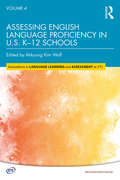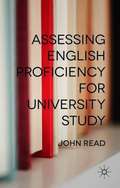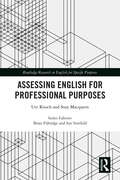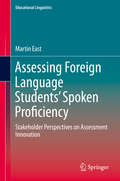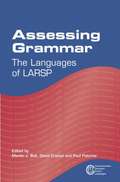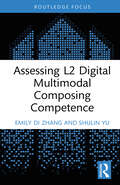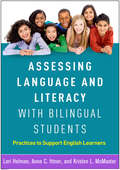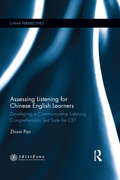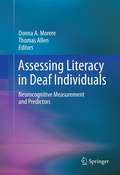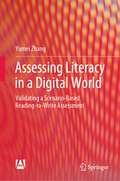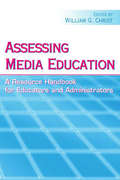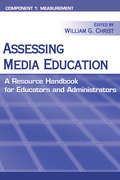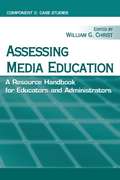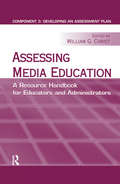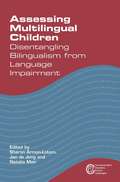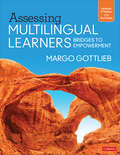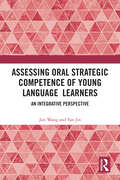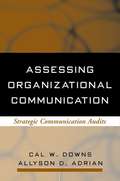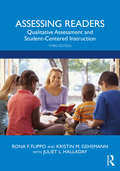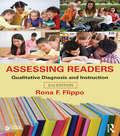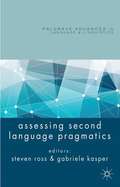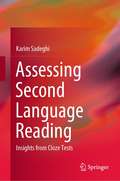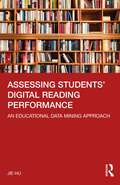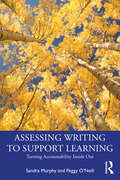- Table View
- List View
Assessing English Language Proficiency in U.S. K–12 Schools
by Mikyung Kim WolfAssessing English Language Proficiency in U.S. K–12 Schools offers comprehensive background information about the generation of standards-based, English language proficiency (ELP) assessments used in U.S. K–12 school settings. The chapters in this book address a variety of key issues involved in the development and use of those assessments: defining an ELP construct driven by new academic content and ELP standards, using technology for K–12 ELP assessments, addressing the needs of various English learner (EL) students taking the assessments, connecting assessment with teaching and learning, and substantiating validity claims. Each chapter also contains suggestions for future research that will contribute to the next generation of K–12 ELP assessments and improve policies and practices in the use of the assessments. This book is intended to be a useful resource for researchers, graduate students, test developers, practitioners, and policymakers who are interested in learning more about large-scale, standards-based ELP assessments for K–12 EL students.
Assessing English Proficiency for University Study
by John ReadThis book focuses on strategies and procedures for assessing the academic language ability of students entering an English-medium university, so that those with significant needs can have access to opportunities to enhance their language skills.
Assessing English for Professional Purposes (Routledge Research in English for Specific Purposes)
by Ute Knoch Susy MacqueenAssessing English for Professional Purposes provides a state-of-the-art account of the various kinds of language assessments used to determine people’s abilities to function linguistically in the workplace. At a time when professional expertise is increasingly mobile and diverse, with highly trained professionals migrating across national boundaries to apply their skills in English-speaking settings, this book offers a renewed agenda for inquiry into language assessments for professional purposes (LAPP). Many of these experts work in high-risk environments where communication breakdowns can have serious consequences. This risk has been identified by governments and professional bodies, who implement language tests for gate-keeping purposes. Through a sociological lens of risk and responsibility, this book: provides a detailed overview of both foundational and recent literature in the field; offers conceptual tools for specific purpose assessment, including a socially oriented theory of construct; develops theory and practice in key areas, such as needs analysis, test development, validation and policy; significantly broadens the scope of the assessment of English for professional purposes to include a range of assessment practices for both professionals and laypeople in professional settings. Assessing English for Professional Purposes is key reading for researchers, graduate students and practitioners working in the area of English for Specific Purposes assessment.
Assessing Foreign Language Students' Spoken Proficiency: Stakeholder Perspectives on Assessment Innovation (Educational Linguistics #26)
by Martin EastThis book presents an indepth study of assessment innovation and its impact on teaching and learning. The context is New Zealand, and the focus is additional languages other than English and the recent introduction of a radical new assessment of students' spoken proficiency, called interact. The book crosses the traditional theoretical and methodological boundaries associated with language testing research, which focuses on assessment performance, and presents an alternative approach where stakeholders become the centre of interest. It advances our understanding of how assessment innovation impacts on two key groups - teachers and students in schools - based on data collected from a substantial twoyear research project. It presents an account of these stakeholders' perceptions of the validity and usefulness of the new assessment in comparison with the more traditional test that it has replaced. Assessing Foreign Language Students' Spoken Proficiency makes an outstanding and original contribution to the field of second and foreign language teaching, providing a theory and research-based account of the development of a learner-centred approach to oral proficiency assessment. It is an important resource for teachers and teacher educators as well as assessment and curriculum specialists worldwide. It deserves to be widely read.
Assessing Grammar
by David Crystal Martin J. BallThis collection brings together versions of the Language Assessment Remediation and Screening Procedure (LARSP) in thirteen different languages from around the world. It will be an invaluable resource for speechlanguage pathologists in many different countries, and for those wishing to analyse the grammatical abilities of clients of many linguistic backgrounds.
Assessing L2 Digital Multimodal Composing Competence (Routledge Focus on Applied Linguistics)
by Emily Di Zhang Shulin YuThis book focuses on assessing L2 student digital multimodal composing (DMC) competence. It explores key themes, including the conceptualization of L2 student DMC competence, and the development, validation, and utilization of L2 student DMC competence in the tertiary context.Through a thorough review of the DMC literature, the book furnishes readers with a theoretical framework to comprehensively grasp the underlying constructs of L2 student DMC competence. It also provides a delineation of the process of scale development, i.e., defining constructs, constructing items, and analyzing items, scale validation, i.e., the structural, external, and consequential construct validity of the scale, and scale utilization in students’ DMC self- and peer-assessment practices.This practical guidance equips educators and practitioners with the necessary tools and strategies to effectively assess and enhance L2 students’ DMC competence. Scholars and professionals in the fields of L2 writing, language assessment, digital literacy, and technology-enhanced language learning will gain valuable insights from the content.
Assessing Language and Literacy with Bilingual Students: Practices to Support English Learners
by Lori Helman Anne C. Ittner Kristen L. McMasterFrom expert authors, this book guides educators to conduct assessments that inform daily instruction and identify the assets that emergent bilinguals bring to the classroom. Effective practices are reviewed for screening, assessment, and progress monitoring in the areas of oral language, beginning reading skills, vocabulary and comprehension in the content areas, and writing. The book also addresses how to establish schoolwide systems of support that incorporate family and community engagement. Packed with practical ideas and vignettes, the book focuses on grades K–6, but also will be useful to middle and high school teachers. Appendices include reproducible forms that can be downloaded and printed in a convenient 8 1/2" x 11" size.
Assessing Listening for Chinese English Learners: Developing a Communicative Listening Comprehension Test Suite for CET (China Perspectives)
by Pan ZhixinThis book reports in detail the newly developed Communicative Listening Comprehension Test (CLCT) for the National College English Test (CET) of China. Following the principles of communicative testing in general and test construction approach proposed by Bachman and Palmer (1996) in particular, the project develops CLCT for CET-4 and CET-6. The research begins with the construction of frameworks of listening task characteristics and communicative listening ability. Subsequently, based on a survey of Chinese college students' English listening needs and an analysis of listening tasks in influential English listening course books and public tests, CLCT-4 and CLCT-6 test specifications are developed. Finally, sample papers are produced and a series of posteriori studies are conducted to examine the difficulty and usefulness of the newly developed notes-completion task type in two CLCT tests. As an example of successful integration of communicative testing theories and test construction practice, this research provides valuable insights into listening test development for other large-scale tests.
Assessing Literacy in Deaf Individuals: Neurocognitive Measurement and Predictors
by Donna Morere Thomas Allen<P>Humans' development of literacy has been a recent focus of intense research from the reading, cognitive, and neuroscience fields. But for individuals who are deaf--who rely greatly on their visual skills for language and learning--the findings don't necessarily apply, leaving theoretical and practical gaps in approaches to their education. <P>Assessing Literacy in Deaf Individuals: Neurocognitive Measurement and Predictors narrows these gaps by introducing the VL2 Toolkit, a comprehensive test battery for assessing the academic skills and cognitive functioning of deaf persons who use sign language. Skills measured include executive functioning, memory, reading, visuospatial ability, writing fluency, math, and expressive and receptive language. Comprehensive data are provided for each, with discussion of validity and reliability issues as well as ethical and legal questions involved in the study. And background chapters explain how the Toolkit was compiled, describing the procedures of the study, its rationale, and salient characteristics of its participants. This notable book: <br>Describes each Toolkit instrument and the psychometric properties it measures. <br>Presents detailed findings on test measures and relationships between skills. <br>Discusses issues and challenges relating to visual representations of English, including fingerspelling and lipreading. <br>Features a factor analysis of the Toolkit measures to identify underlying cognitive structures in deaf learners. <br>Reviews trends in American Sign Language assessment. <br>Assessing Literacy in Deaf Individuals is an essential reference for researchers, graduate students, clinicians, and other professionals working in the field of deafness and deaf education across in such areas as clinical child and school psychology, audiology, and linguistics.
Assessing Literacy in a Digital World: Validating a Scenario-Based Reading-to-Write Assessment
by Yumei ZhangThis book illustrates the latest developments in literacy and language assessment in the digital context, and subsequently presents a rigorous validation study on a newly proposed form of assessment (scenario-based assessment, SBA) that seeks to respond to the contextual change of literacy activities. It combines theories and innovative practices in both the literacy and language assessment sectors. The empirical validation study on SBA, presented here, can help readers understand how digital scenarios can be realized in assessment practices with the aid of computer technology, and how the scenario settings in the digital context can affect EFL learners’ reading-to-writing performance. In this way, it can facilitate the reconceptualization of L2 literacy in the digital context. Moreover, the evidence and critical examination presented here can offer readers more comprehensive insights into the value or validity of a given innovative approach before it is adopted in their contexts.
Assessing Media Education: A Resource Handbook for Educators and Administrators (Routledge Communication Series)
by William G. ChristThis component of Assessing Media Education is intended for those who would like to know how other schools have grappled with implementing assessment initiatives, and who have used assessment to improve their programs.
Assessing Media Education: A Resource Handbook for Educators and Administrators: Component 1: Measurement (Routledge Communication Ser.)
by William G. ChristThe chapters included in this component of Assessing Media Education are intended for those who have already developed an assessment plan and identified key student learning outcomes, and who need more information on how to measure the outcomes both indirectly and directly.
Assessing Media Education: A Resource Handbook for Educators and Administrators: Component 2: Case Studies (Routledge Communication Series)
by William G. ChristThis component of Assessing Media Education is intended for those who would like to know how other schools have grappled with implementing assessment initiatives, and who have used assessment to improve their programs.
Assessing Media Education: A Resource Handbook for Educators and Administrators: Component 3: Developing an Assessment Plan (Routledge Communication Ser.)
by William G. ChristThe chapters in this component of Assessing Media Education are valuable for those who need to know how to develop an assessment plan.
Assessing Multilingual Children
by Sharon Armon-Lotem Jan De Jong Natalia MeirSecond language learners often produce language forms resembling those of children with Specific Language Impairment (SLI). At present, medical, language and educational professionals have only limited diagnostic instruments to distinguish language impaired migrant children from those who will eventually catch up with their monolingual peers. This book presents a comprehensive set of tools for assessing the linguistic abilities of bilingual children. It aims to disentangle effects of bilingualism from those of SLI, making use of both models of bilingualism and models of language impairment. The book's methods-oriented focus will make it an essential handbook for practitioners who look for measures which could be adapted to a variety of languages in diverse communities, as well as academic researchers.
Assessing Multilingual Learners: Bridges to Empowerment
by Margo GottliebEmpowering multilingual learners, families, and teachers With its emphasis on relationship building as the backdrop for linguistically and culturally sustainable assessment, the bestselling second edition of Assessing Multilingual Learners significantly impacted the field of language education. Applying the groundbreaking assessment "as," "for," and "of" learning model to new contexts, this updated third edition offers educators welcoming and encouraging ways to support multilingual learners to succeed in school and beyond. Through eight thoroughly revised chapters, Dr. Margo Gottlieb ties assessment to teaching and learning to foster agency and empowerment for multilingual learners, families, and teachers. This book envisions assessment as a process integral to and embedded in curriculum and instruction through: Assets-based language Student-centered activities Classroom assessment tools Portraits of practice illustrating authentic assessment practices References and resources for stimulating discussion Deep questioning for thinking through processes, dilemmas, or challenges Assessing Multilingual Learners explores the realities and possibilities of classroom assessment as a road to inspire multilingual learners, their families, and teachers to reach great heights.
Assessing Multilingual Learners: Bridges to Empowerment
by Margo GottliebEmpowering multilingual learners, families, and teachers With its emphasis on relationship building as the backdrop for linguistically and culturally sustainable assessment, the bestselling second edition of Assessing Multilingual Learners significantly impacted the field of language education. Applying the groundbreaking assessment "as," "for," and "of" learning model to new contexts, this updated third edition offers educators welcoming and encouraging ways to support multilingual learners to succeed in school and beyond. Through eight thoroughly revised chapters, Dr. Margo Gottlieb ties assessment to teaching and learning to foster agency and empowerment for multilingual learners, families, and teachers. This book envisions assessment as a process integral to and embedded in curriculum and instruction through: Assets-based language Student-centered activities Classroom assessment tools Portraits of practice illustrating authentic assessment practices References and resources for stimulating discussion Deep questioning for thinking through processes, dilemmas, or challenges Assessing Multilingual Learners explores the realities and possibilities of classroom assessment as a road to inspire multilingual learners, their families, and teachers to reach great heights.
Assessing Oral Strategic Competence of Young Language Learners: An Integrative Perspective
by Jun Wang Yan JinThis book presents an empirical study that develops and validates a learning-oriented self-assessment instrument for assessing the strategic competence (SC) of young language learners in oral communication, specifically within the context of early English education in China.The instrument’s development followed a multi-phased research design, encompassing three interconnected stages: conceptualisation, operationalisation and validation. Each phase employed distinct methods, data collection techniques and analyses tailored to specific research objectives. By adopting an integrative approach, this book clarifies the crucial yet elusive concept of SC. It not only contributes to the field of language assessment but also underscores the importance of explicit SC instruction in language education for young learners.Focusing on real-world classroom scenarios and offering practical solutions for integrating SC instruction into current teaching paradigms, this book will appeal to educators, researchers and policymakers interested in language testing and assessment, foreign language education and applied linguistics.
Assessing Organizational Communication
by Cal W. Downs Allyson D. AdrianThis essential guide offers a detailed framework for assessing communication processes within an organization and using the results to develop improved organizational strategies. Presented in clear, accessible prose are the "tools of the trade" for planning and initiating audits, gathering data using a wide variety of methodologies, analyzing the findings, and preparing effective reports. Throughout, practical examples drawn from the authors' influential work in the field help readers understand the real-world applications of the concepts discussed and gain skills for creative problem solving. A successor volume to Cal Downs's popular Communication Audits, the book has been extensively rewritten with many new topics and two entirely new chapters reflecting today's critical issues and best practices. It will serve as both an authoritative primer for human resource and management consultants and a comprehensive text for undergraduate and graduate students in organizational communication.
Assessing Readers: Qualitative Assessment and Student-Centered Instruction
by Rona F. Flippo Kristin M. Gehsmann Juliet L. HalladayThe third edition of Assessing Readers continues to bridge the gap between authentic, informal, and formative assessments and more traditional quantitative and summative assessment approaches. Designed to assist educators and reading specialists in making informed decisions about not only what to assess, but also how, it provides teachers with a menu of qualitative assessment options, encouraging them to consider their own values and beliefs in light of the goals they have for the students they teach. Building on nearly four decades of theory, research, and practice, it is up to date with current research and offers specific assessment, instruction, and organizational ideas and strategies. With an emphasis on comprehension, motivation and engagement, and developing strategic knowledge, Assessing Readers offers a road map for teachers trying to meet the demands of increasingly rigorous standards. Features include examples of student-centered assessment, ideas for organizing and managing differentiated instruction, sample lesson plans, and authentic case studies. Accessible and practical, the third edition empowers pre-service and in-service teachers alike, encouraging them to think about the importance of their assessment and instructional choices and supporting them with the tools they need to achieve their goals and meet the needs of all students. Changes in the Third Edition: A new focus on literacy development and developmentally responsive instruction Expanded coverage of emergent literacy and the assessment of foundational skills, including concepts about print, storybook reading, phonological and phonemic awareness, alphabet knowledge, and concept of word in text A new section on assessing vocabulary and morphological knowledge Expanded coverage of response to instruction/intervention (RTI) New information on assessment and instruction of culturally and linguistically diverse students Increased attention to issues of social justice, educational equity, and anti-bias practices
Assessing Readers: Qualitative Diagnosis and Instruction, Second Edition
by Rona FlippoA Co-publication of Routledge and the International Reading Association This new edition of Assessing Readers continues to bridge the gap between authentic, informal, and formative assessments, and more traditional quantitative, and summative assessment approaches. At the heart of the book is respect and confidence in the capabilities of knowledgeable teachers to make the correct literacy decisions for the students they teach based on appropriate assessments. Inclusive and practical, it supports individual classroom teachers' knowledge, beliefs, decisions, and roles and offers specific assessment, instruction, and organizational ideas and strategies, while incorporating a range of perspectives that inform the field of reading and literacy education, covering the most important ideas and information found in more traditional reading diagnosis books. Changes in the Second Edition Addresses the Common Core State Standards Includes Response to Intervention (RTI) Discusses family literacy in language-diverse homes and the needs of ELL students Covers formative assessment Offers ideas and guidelines for ELL assessment Looks at issues of accountability and teaching to prescribed state tests and objectives versus accommodating to them – the pitfalls and problems and how to cope Provides new practical examples, including new rubrics, more teacher-developed cognitive assessments, a new case study, and new teacher-developed strategy lessons
Assessing Second Language Pragmatics
by Steven J. Ross Gabriele KasperThis volume is the first book-length collection of studies on the assessment of pragmatic competencies in a second or foreign language. Grounded in theoretical perspectives on communicative and interactional competencies, the first section of the book examines the reception and production of speech acts through a variety of assessment methods and a range of quantitative and qualitative analyses. The second section investigates interviewer and candidate interaction in different forms of oralproficiency interview.
Assessing Second Language Reading: Insights from Cloze Tests
by Karim SadeghiThis book investigates the issue of cloze-validity as a measure of second language reading comprehension. It starts off by making a distinction between general reading ability and the more specific reading comprehension followed by a thorough review of the related research on L2 reading comprehension and sorting out the confusion in the literature in this categorization. A comprehensive account of cloze procedure is presented discussing its origin, different versions, its use for teaching and testing purposes, as well the latest research on cloze as measures of readability, language proficiency and second language reading. The book includes studies conducted at several stages on validating cloze as a measure of reading and interview and questionnaire techniques are applied to investigate the validity of eight cloze tests, criterion reading tests, and other cloze and reading tests in general. Two new cloze tests, i.e. reader-centered cloze test and phrase cloze test, are also introduced and researched as measures of reading ability. The book concludes with suggestions for developing tests that can better measure reading comprehension in light of recent research insights on the complex and dynamic nature of reading. This book will appeal to researchers, lecturers and graduate and post-graduate students taking a course in Second Language Acquisition, Applied Linguistics, TESOL, Language Assessment, and Educational Measurement.
Assessing Students' Digital Reading Performance: An Educational Data Mining Approach
by Jie HUThis book provides a systematic study of the Programme for International Student Assessment (PISA) based on big data analysis, aiming to examine the contextual factors relevant to students’ digital reading performance. The author first introduces the research landscape of educational data mining (EDM) and reviews the PISA framework since its launch and how it has become an important metric to assess the knowledge and skills of students from across the globe. With a focus on methodology and its applications, the book explores extant scholarship on the dynamic model of educational effectiveness, multi-level factors of digital reading performance, and the application of EDM approaches. The core chapter on the methodology examines machine learning algorithms, hierarchical linear modeling, mediation analysis, and data extraction and processing for the PISA dataset. The findings give insights into the influencing factors of students’ digital reading performance, allowing for further investigations on improving students’ digital reading literacy and more attention to the advancement of education effectiveness. The book will appeal to scholars, professionals, and policymakers interested in reading education, educational data mining, educational technology, and PISA, as well as students learning how to utilize machine learning algorithms in examining the mass global database.
Assessing Writing to Support Learning: Turning Accountability Inside Out
by Sandra Murphy Peggy O'NeillIn this book, authors Murphy and O’Neill propose a new way forward, moving away from high-stakes, test-based writing assessment and the curriculum it generates and toward an approach to assessment that centers on student learning and success. Reviewing the landscape of writing assessment and existing research-based theories on writing, the authors demonstrate how a test-based approach to accountability and current practices have undermined effective teaching and learning of writing. This book bridges the gap between real-world writing that takes place in schools, college, and careers and the writing that students are asked to do in standardized writing assessments to offer a new ecological approach to writing assessment. Murphy and O’Neill’s new way forward turns accountability inside out to help teachers understand the role of formative assessments and assessment as inquiry. It also brings the outside in, by bridging the gap between authentic writing and writing assessment. Through these two strands, readers learn how assessment systems can be restructured to become better aligned with contemporary understandings of writing and with best practices in teaching. With examples of assessments from elementary school through college, chapters include guidance on designing assessments to address multiple kinds of writing, integrate reading with writing, and incorporate digital technology and multimodality. Emphasizing the central role that teachers play in systemic reform, the authors offer sample assessments developed with intensive teacher involvement that support learning and provide information for the evaluation of programs and schools. This book is an essential resource for graduate students, instructors, scholars and policymakers in writing assessment, composition, and English education.
